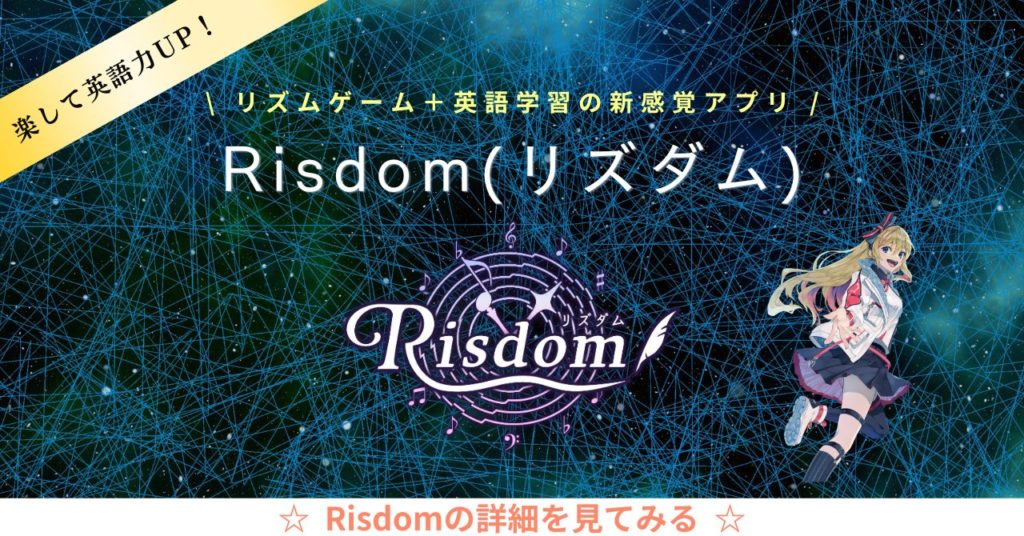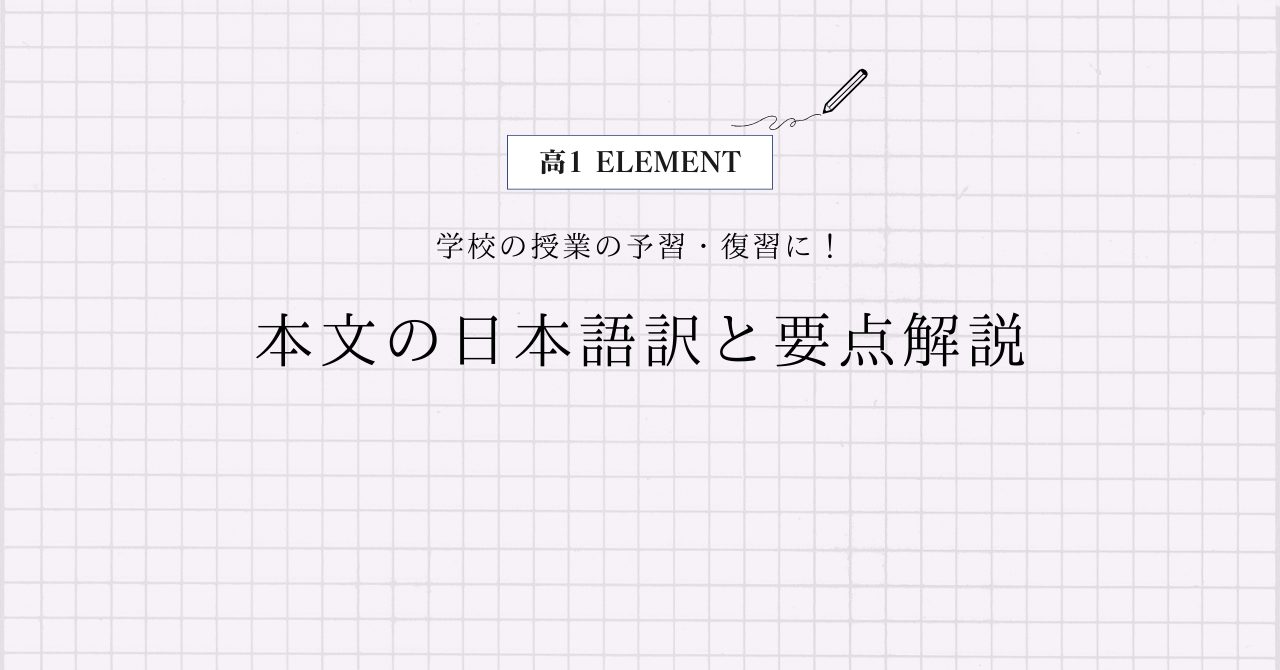三省堂 高1ELEMENT Lesson6 Section2の本文の日本語訳と重要箇所の解説です。
Lesson6-1, 6-3, 6-4の解説はこちらからご覧ください。
>高1ELEMENT Lesson6 Section1 本文和訳
>高1ELEMENT Lesson6 Section3 本文和訳
>高1ELEMENT Lesson6 Section4 本文和訳
- ELEMENT Lesson6 Section2 本文と日本語訳
- ELEMENT Lesson6 Section2 重要事項の解説
- In Japan, different people use different onomatopoeia for the peach floating down the river when they tell the story.
- Eiko’s father used donburakok-ko-oh, suk, kok-ko-oh, which has a pleasant rhythm, and she liked listening to it.
- Even now, those words come back to her.
- When her work is not going well, she says donburakok-ko-oh, suk, kok-ko-oh unconsciously.
- When she does so, she can keep writing her story.
- The words are her magic spell.
- In everyday life, people hear the songs of birds and the sounds of wind, rain, and human life such as walking around, opening doors, and cooking.
- In Japan, hearing these sounds, people have used their imaginations and created many onomatopoeic phrases.
- Eiko’s father was really good at creating his own onomatopoeia, which made the stories ever so delightful.
- Thanks to her father, Eiko came to love stories.
- ELEMENT Lesson6 Section2 まとめ
ELEMENT Lesson6 Section2 本文と日本語訳
In Japan, different people use different onomatopoeia for the peach floating down the river when they tell the story.
「日本では、その物語を話すとき、様々な人が川に流される桃に様々な擬音語を使います。」
Eiko’s father used donburakok-ko-oh, suk, kok-ko-oh, which has a pleasant rhythm, and she liked listening to it.
「栄子さんの父親はどんぶらこっこ、すっこっこを使っていましたが、それは気持ちの良いリズムで、彼女はそれを聞くのが好きでした。」
Even now, those words come back to her.
「いまだに、彼女はそれらの言葉を思い出します。」
When her work is not going well, she says donburakok-ko-oh, suk, kok-ko-oh unconsciously.
「仕事が上手くいっていないとき、彼女は無意識にどんぶらこっこ、すっこっこと言います。」
When she does so, she can keep writing her story.
「そうすると、彼女は物語を書き続けられるのです。」
The words are her magic spell.
「その言葉は彼女の魔法の呪文なのです。」
In everyday life, people hear the songs of birds and the sounds of wind, rain, and human life such as walking around, opening doors, and cooking.
「毎日の生活の中で、人々は鳥のさえずりや、風や雨、そして歩きまわる、ドアを開ける、料理をするというような人間の生活の音を聞いています。」
In Japan, hearing these sounds, people have used their imaginations and created many onomatopoeic phrases.
「日本では、人々はこういった音を聞きながら、想像力を働かせて、多くの擬音表現を生み出してきています。」
Eiko’s father was really good at creating his own onomatopoeia, which made the stories ever so delightful.
「栄子さんの父親は本当に独自の擬音語を生み出すのが上手で、その擬音語は物語を非常に楽しいものにしました。」
Thanks to her father, Eiko came to love stories.
「父親のおかげで、栄子さんは物語が大好きになりました。」

ELEMENT Lesson6 Section2 重要事項の解説
In Japan, different people use different onomatopoeia for the peach floating down the river when they tell the story.
“different”は「様々な、異なった」という形容詞で、“onomatopoeia”は「擬音語、オノマトペ」という不可算名詞、“peach”は「桃」という名詞ですね。
“use A for B”で「AをBに使う」となります。
“float down the river”は「川を下る、川に流される」という意味で、ここでは「現在分詞」として直前の”the peach“を修飾しています。
また、「接続詞when」も使われていますね。
“they”は“different people”を指していて、“story”は「物語、話」という名詞です。
Eiko’s father used donburakok-ko-oh, suk, kok-ko-oh, which has a pleasant rhythm, and she liked listening to it.
名詞に‘sを付けると「~の」という所有を表します。
直前の名詞が複数形のときは” teachers‘ “のようにアポストロフィーだけを最後に付けます。
“donburakok-ko-oh“は「どんぶらこっこ」、“suk, kok-ko-oh“は「すっこっこ」でOKです。
“which”は「主格の関係代名詞」ですが、カンマが付いているので「非制限用法」で、“which has a pleasant rhythm”が先行詞“donburakok-ko-oh, suk, kok-ko-oh“を修飾しています。
「非制限用法」は名詞の補足説明をしたいときに使います。訳すときはふつう前から順に訳していきます。
“pleasant”は「楽しい、愉快な、気持ちの良い」といった形容詞で、“rhythm”は「リズム、調子」といった名詞になります。
“listening”は「動名詞」になっていて、“it”は“donburakok-ko-oh, suk, kok-ko-oh“を指しています。
Even now, those words come back to her.
“even now”は「今でさえ、いまだに」という副詞表現です。
“those”は“that”の複数形で,「あれらは(の)」といった意味になりますが,「それらは(の)」と訳すことが多いです。
“word”は「言葉、単語」という名詞で、“come back”は「戻る、帰る、思い出される」という表現ですね。
この文を直訳すると「いまだに、それらの言葉は彼女に戻ってきます。」となりますが、今回は「いまだに、彼女はそれらの言葉を思い出します。」と訳しました。
When her work is not going well, she says donburakok-ko-oh, suk, kok-ko-oh unconsciously.
ここでは「接続詞when」が使われていますね。
“work”は「仕事、取り組み」という名詞で、“go well”は「うまくいく、順調に進む」という表現です。今回は「現在進行形」になっています。
“unconsciously”は「無意識に」という副詞ですね。
When she does so, she can keep writing her story.
ここでも「接続詞when」が使われていますね。
“does”は「代動詞」で、“does so”は“says donburakok-ko-oh, suk, kok-ko-oh“を指しています。
“keep -ing”は「~し続ける」という重要表現になります。“keep on -ing”でも同じ意味になりますよ。
The words are her magic spell.
“magic”は「魔法の」という形容詞、“spell”は「呪文」という名詞になります。
合わせて「魔法の言葉」と訳してもOKですね。
In everyday life, people hear the songs of birds and the sounds of wind, rain, and human life such as walking around, opening doors, and cooking.
“everyday”は「毎日の」という形容詞で、“life”は「生活、人生、命」という名詞です。
“of”は前置詞で、”A of B”の形で「BのA」というように後ろから前に訳します。
“sound”は「音」、“wind”は「風」という名詞、“human”は「人間の」という形容詞になります。
“such as~”は「~のような、~など」という重要表現ですね。
“walk around”は「歩き回る」という意味で、“walking”、“opening”、“cooking”はすべて「動名詞」になっています。
また,3つ以上の単語を“and”で繋げたいときは,最後の単語の前に”and”を置いて,それ以外はカンマ(,)で繋ぎます。
例えばA, B, C, Dの4つを並べるときは,“A, B, C and D”としてあげます。“and”の前にカンマを入れてもOKです。
In Japan, hearing these sounds, people have used their imaginations and created many onomatopoeic phrases.
“hearing these sounds”は「分詞構文」の「付帯状況」という用法になっていて、「~しながら」と訳してあげます。
“these”は“this”の複数形で,「これらは(の)」といった意味になります。
“have used”は「現在完了形」になっていますね。
“their”は“people”を指していて、“imagination”は「想像力」という名詞です。
“create”は「を創造する、創る」という動詞で、“phrase”は「言い回し、表現」といった名詞になります。
Eiko’s father was really good at creating his own onomatopoeia, which made the stories ever so delightful.
“be good at~”は「~が得意だ」という重要表現で、前置詞“at”の後ろなので、“creating”と「動名詞」になっていますね。
“own”は「自身の、独自の」という形容詞です。
この“which”もカンマが付いているので「主格の関係代名詞」の「非制限用法」で、“which made the stories ever so delightful”が先行詞“his own onomatopoeia”を修飾しています。
“make 名詞 形容詞/名詞”で、「名詞を~(の状態)にする、させる」という重要表現で、“ever so”は「非常に」という副詞表現、“delightful”は「楽しい、愉快な」という形容詞になります。
Thanks to her father, Eiko came to love stories.
“thanks to~”は「~のおかげで」という重要表現になります。
“come to 動詞の原形”は「~するようになる」という意味ですね。
ELEMENT Lesson6 Section2 まとめ
以上がELEMENT Lesson6 Section2の日本語訳となります。
「関係代名詞」「分詞構文」などの使い方をしっかり確認しておきましょう!
>高1ELEMENT Lesson6 Section1 本文和訳
>高1ELEMENT Lesson6 Section3 本文和訳
>高1ELEMENT Lesson6 Section4 本文和訳
何か分からない点や他に解説してほしい点があれば,お気軽にコメントしてください!


コメント